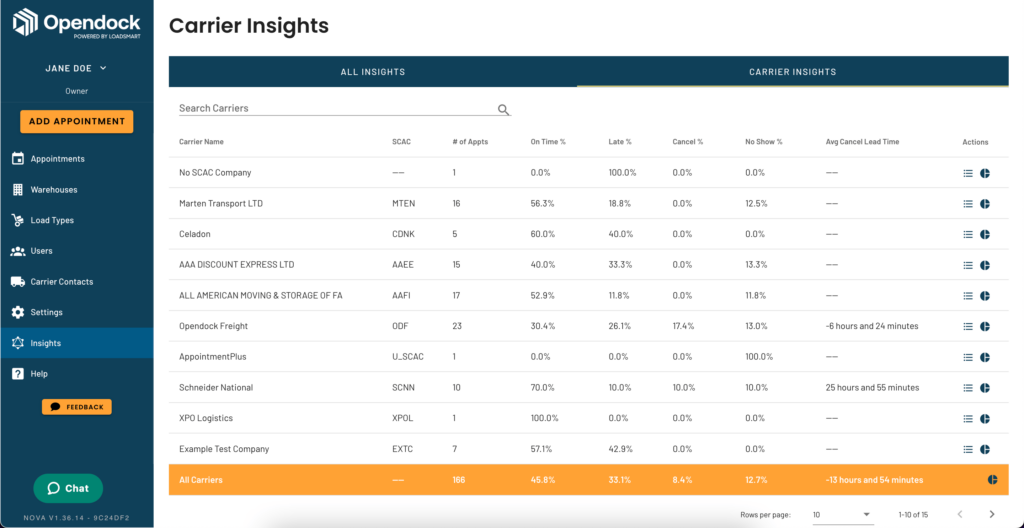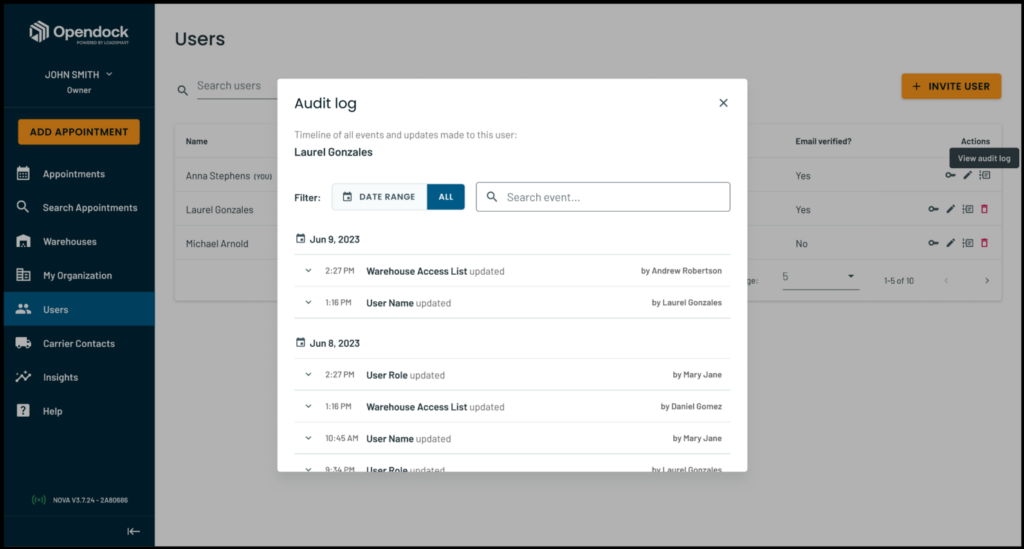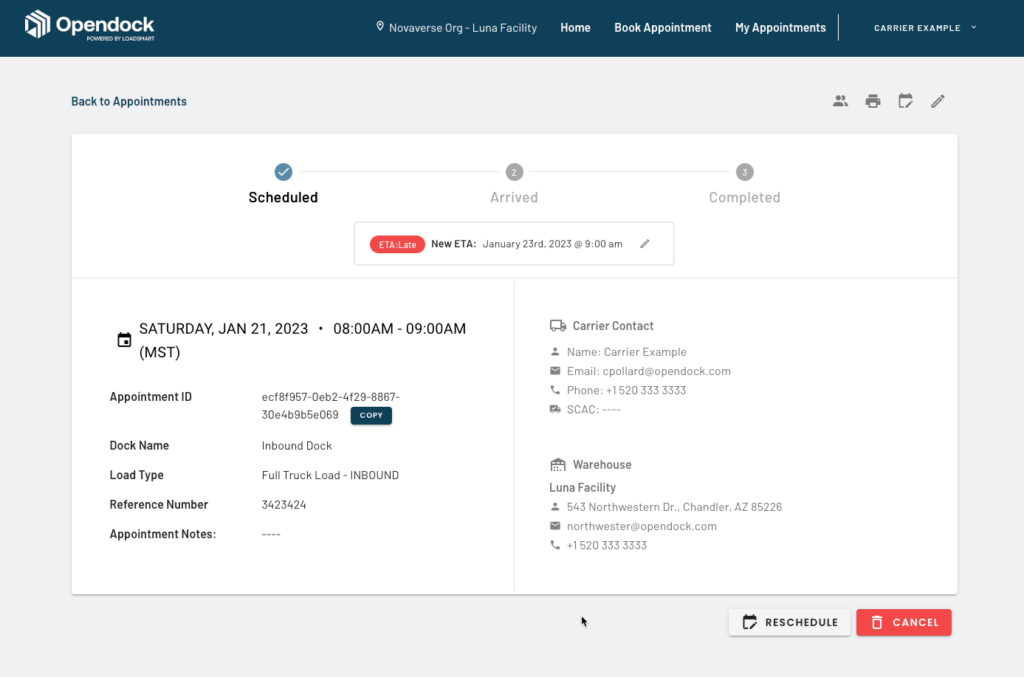Opendock shines as a beacon in the world of dock scheduling, where missed appointments and inefficient loading can cause major headaches for businesses. Imagine a single platform that streamlines the entire appointment management process for carriers, brokers, and warehouses; Opendock does just this at an annual cost of $6000.
With its cloud-based environment, it introduces game-changing features like automated scheduling and real-time updates to keep everything running smoothly.
The need for such innovation is particularly acute in fast-moving sectors like healthcare and logistics, where time is always of the essence. But Opendock isn’t just about speed – it also offers detailed performance metrics and reports to help users make smarter business decisions.
And with round-the-clock support through various training methods, clients are never left out in the cold.
Users praise Opendock’s knack for simplifying complex booking processes but hope for more flexibility in testing it out without initial costs. Meanwhile, alternatives like InventoryCloud or 3PL Warehouse Management System offer different approaches to warehouse management that might better suit other needs or budgets.
As we look ahead, trends suggest even smarter automation on the horizon for docking technology. Efficiency enthusiasts will find themselves drawn to these advancements that promise smoother operations down the line.
Let this be your introduction to finding out how Opendock stands tall among its competitors—and whether it’s right for your business’s future. Discover a new level of organization awaits!

Key Takeaways
- Opendock is a centralized dock scheduling platform designed to improve efficiency in the booking process for carriers, brokers, and warehouses.
- Pricing starts with an annual license fee of $6,000 for comprehensive use but offers free access for certain users like carriers.
- The software features enhanced visibility through real-time notifications and performance tracking tools that enable data-driven decision-making.
- It faces competition from alternatives such as InventoryCloud and 3PL Warehouse Management System, each offering unique features tailored to different needs.
- Key factors influencing the cost of Opendock include industry – specific requirements, size and scale of operation, support options chosen by the business, training necessities, implementation method, integration with existing systems; these should be evaluated carefully.
Understanding Opendock: A Comprehensive Overview
Opendock shines as a beacon in the world of dock scheduling, where missed appointments and inefficient loading can cause major headaches for businesses. Imagine a single platform that streamlines the entire appointment management process for carriers, brokers, and warehouses; Opendock does just this at an annual cost of $6000.
With its cloud-based environment, it introduces game-changing features like automated scheduling and real-time updates to keep everything running smoothly.
The need for such innovation is particularly acute in fast-moving sectors like healthcare and logistics, where time is always of the essence. But Opendock isn’t just about speed – it also offers detailed performance metrics and reports to help users make smarter business decisions.
And with round-the-clock support through various training methods, clients are never left out in the cold.
Users praise Opendock’s knack for simplifying complex booking processes but hope for more flexibility in testing it out without initial costs. Meanwhile, alternatives like InventoryCloud or 3PL Warehouse Management System offer different approaches to warehouse management that might better suit other needs or budgets.
As we look ahead, trends suggest even smarter automation on the horizon for docking technology. Efficiency enthusiasts will find themselves drawn to these advancements that promise smoother operations down the line.
Let this be your introduction to finding out how Opendock stands tall among its competitors—and whether it’s right for your business’s future. Discover a new level of organization awaits!

What Opendock is and its purpose
Opendock stands as a centralized dock scheduling platform designed to streamline the appointment booking process for carriers and brokers. It enables efficient management of freight deliveries, optimizing the way warehouses handle incoming and outgoing shipments.
With Opendock, companies involved in supply chain operations can effectively schedule delivery times, reducing wait periods and enhancing overall logistics coordination.
The purpose of Opendock goes beyond mere scheduling; it plays a critical role in carrier management by providing tools that improve reliability and communication between shippers and receivers.
By integrating features commonly found in sophisticated brokerage software with exclusive capabilities like online appointment scheduling and performance tracking, Opendock serves as an essential component for modern logistics software systems, fostering improved warehouse management practices within the supply chain framework.
Key industries and users of Opendock
Healthcare providers rely heavily on Opendock to streamline their delivery and supply chain processes, ensuring that critical medical supplies reach their destinations swiftly. Logistics operations benefit from the platform’s ability to optimize dock scheduling, resulting in more efficient loading and unloading of freight.
Dental and orthodontic practices use Opendock to manage deliveries of essential equipment without interrupting patient appointments, while wellness professionals maintain a steady flow of health products.
E-commerce giants, retail chains, and 3PL companies find great value in Opendock for keeping up with the rapid pace of online orders and returns. The software equips them with real-time visibility into dock availability which is key for managing high-volume shipping operations effectively.
These users come from diverse sectors but share common goals: improving turnaround times, reducing wait times at docks, and ultimately enhancing overall productivity. Moving forward into the core features section will delve deeper into how these capabilities impact day-to-day operations across industries.
Delving into Opendock’s Core Features
Dive deep into the essence of Opendock, where its robust core features streamline dock scheduling and management to new levels of operational efficiency. Uncover how this platform transforms logistical coordination with cutting-edge tools that enhance visibility and performance for a myriad of industries.
Scheduling and Visibility Enhancements
Opendock transforms dock management with powerful scheduling tools and significant visibility improvements. Users experience a boost in productivity thanks to automated appointment booking that cuts out time-consuming manual processes.
Real-time notifications keep teams informed of schedule changes, ensuring everyone is on the same page and can adjust quickly.
With enhanced tracking features, Opendock provides detailed insights into appointment status and digital marketing analytics. This level of detail empowers users to make data-driven decisions about their operations, resulting in smoother dock turnover and increased efficiency across the board.
The integration of real-time updates means stakeholders maintain visibility at every stage, from scheduling to completion, aligning logistics seamlessly with business goals.
Performance Tracking and Reporting Capabilities
Performance tracking and reporting capabilities in Opendock streamline how distribution centers manage their docks. With tools to monitor appointments, automated scheduling, and availability, managers gain deep insights into optimizing dock productivity.
These cloud-based reporting tools transform raw data into actionable intelligence, enabling better decision-making that leads to improved traffic flow and warehouse efficiency.
Managers leverage this transportation management software to stay ahead of the curve in a competitive logistics environment. Real-time updates and comprehensive reports allow for quick adjustments, ensuring that resources are used effectively.
The ability to track performance not only improves current operations but also aids in planning future strategies for continued growth and success.
Evaluating Opendock Pricing: Is It Worth the Investment?
Determining the value of Opendock comes down to analyzing its pricing structure against the operational efficiencies it promises. Businesses must weigh cost considerations with the potential for streamlined dock scheduling and enhanced warehouse management that can drive bottom-line improvements.
Opendock’s pricing structure
Understanding Opendock’s pricing structure is essential for evaluating whether it fits your budget and offers a good return on investment. The financial assessment of this dock scheduling software helps to identify its value proposition within your organization.
| Aspect | Details |
|---|---|
| Annual License Fee | $6,000 for comprehensive use of the platform for one year |
| Free Trial or Version | No free trials or versions available |
| Free Access for Certain Users | Carriers, brokers, and dispatchers can access at no charge |
| Warehouse Pricing | Starts at $250 for entry-level access |
| Enterprise Solutions | Available for larger organizations with expanded features and additional costs |
| Clear Pricing Model | Straightforward pricing with no hidden fees |
| Focus on ROI | Performance tracking and visibility enhancements to clarify potential return on investment |
Factors influencing the cost of Opendock
Evaluating Opendock pricing requires an understanding of various factors that shape the overall cost. These elements can significantly impact whether this tool represents a sound financial decision for a company.
- Pricing Structure: Opendock’s annual base price stands at $6000, catering primarily to warehouses looking for efficient scheduling solutions. The yearly investment sets the foundation for what users can expect in terms of basic service.
- Industry-Specific Needs: Costs may vary depending on the specific requirements of different industries and users. Warehouses might need additional features that add to the initial price, while carriers, brokers, and dispatchers can utilize some services free of charge.
- Size and Scale: Larger enterprises might require broader implementation across multiple locations, driving up costs due to the increased scale of deployment.
- Support Options: With support ranging from email help desks to 24/7 live representatives, businesses must consider which level of customer service they will likely need – more comprehensive support could influence the final cost.
- Training Necessities: Depending on how tech-savvy a workforce is, companies may invest more in training sessions available through various channels like live online or in-person sessions which Opendock provides.
- Implementation Method: Whether a business opts for cloud-based SaaS or an on-premise solution affects not only initial setup complexity but potentially ongoing maintenance fees as well.
- Warehouse Management Solutions Integration: Incorporating Opendock into existing warehouse management systems could incur additional fees for integration and compatibility adjustments.
- Carrier and Broker Tools Access: While basic access might be free for these users, advanced features that enhance their experience could increase their overall spend on the software.

Opendock in Action: User Reviews and Feedback
Hearing directly from those who navigate the daily logistics with Opendock, user reviews and feedback provide an essential gauge of how this dock scheduling solution translates into real-world scenarios.
Each anecdote offers a narrative on the software’s strengths while candidly addressing areas where users are hoping to see enhancements, painting a realistic portrait of its operational impact.
Analysis of user experiences
Users of Opendock highlight the system’s ability to increase dock productivity and ease the shipping schedule management process. They praise its user-friendly interface, noting how it simplifies automating supplier appointments and streamlines appointment booking without requiring a dedicated team.
This efficiently optimizes traffic flow, evident in the way users can access dock schedules at any time. Many find that these features have significantly improved their daily operations.
Despite these benefits, there are concerns regarding Opendock’s pricing structure with some warehouses finding it challenging to justify an annual cost of $6000, especially in the absence of a free trial.
Frustration brews among certain users over what they perceive as inflexible pricing options starting at $250; this point is particularly poignant for smaller or just-beginning warehouse operations seeking cost-effective solutions.
Strengths and areas for improvement according to current users
Reflecting on the experiences of those who have integrated Opendock into their operations reveals insights into the solution’s advantages and potential areas for enhancement. Users often highlight several key strengths that contribute significantly to improving business processes, as well as some challenges that could be addressed to make Opendock even more effective.
- User-Friendly Interface: Opendock shines with its ease of use, offering intuitive drag & drop features that streamline appointment management. This approach simplifies scheduling for users, facilitating quick adjustments and efficient planning.
- Customizable Functionality: The platform provides customizable web business cards and marketing tools, empowering businesses to tailor the software to fit their unique needs.
- Robust Support System: With a comprehensive support framework including email/help desk, phone support, a 24/7 live representative, and chat options, Opendock ensures users can get assistance whenever needed.
- Effective Appointment Management: Opendock excels in maintaining client appointments effectively. Its booking system is designed for simplicity and flexibility which enhances overall client management.
- Business Growth Potential: By leveraging tools for revenue tracking and analyzing customer demographics, clients using Opendock can identify growth opportunities and refine their business strategies.
- Expanded Training Options: While current training resources are helpful, users suggest that even more extensive materials could enhance their understanding and utilization of all features.
- Advanced Analytics Features: Users appreciate insights into appointment analytics but express a desire for deeper analysis capabilities to better understand customer behavior and preferences.
- Broader Integration Capabilities: Some users hope for expanded integration with other systems to synchronize data across platforms seamlessly.
- Fine-Tuning Performance Tracking: Enhancing performance tracking features would provide organizations with even more precise data about their operations.
Exploring Alternatives to Opendock for Dock Scheduling and Management
While Opendock stands out in the realm of dock scheduling solutions, it’s crucial for businesses to know their options. A careful examination of the market reveals several competitors that might align more closely with different operational needs or budgetary constraints, presenting a rich landscape for companies seeking tailored efficiency in their dock management practices.
Top Alternatives to Opendock
Exploring alternatives to Opendock can revolutionize your dock scheduling and management. Businesses have various options each with unique features to enhance logistics efficiency.
- InventoryCloud: This comprehensive warehouse management solution offers real-time tracking of inventory levels, orders, and shipments. Its automated scheduling solutions cut down on manual data entry and increase accuracy, making it a strong Opendock contender.
- 3PL Warehouse Management System: Tailored for third-party logistics providers, this system streamlines operations with features like e-commerce integration and batch picking. It shines in transport management systems by optimizing the shipping process and reducing errors.
- Entree: Focused on food distribution industries, Entree provides specialized inventory management software. Users benefit from its supply chain optimization tools that include lot tracking and expiration date monitoring for better control over perishable goods.
Brief overview of each alternative’s key features
As we consider the top alternatives to Opendock, it’s essential to delve into what sets each option apart. Here are their key features laid out clearly:
- Latitude WMS: A powerhouse in distribution operations, this warehouse management system provides scalability and a suite of advanced features for modern logistics. Expect capabilities that enhance inventory tracking, order fulfillment, and overall efficiency within warehouses.
- EZnet Scheduler: Tailored scheduling meets robust customization with EZnet Scheduler. This program excels at handling complex appointment tracking challenges across various industries with online scheduling options, providing users with flexibility and precision.
- Cargoson: This TMS software stands out with its straightforward plug & play carrier integrations. Designed for ease of use, Cargoson streamlines shipping processes by connecting businesses quickly with transport services.
- UltraShipTMS: Embrace full process automation in transportation logistics through UltraShipTMS. Its cloud-based solution offers an array of modules focused on rating and routing as well as tendering operations, bolstered by comprehensive track & trace functions.
Opendock vs. Competitors: A Side-by-Side Comparison
In the quest for operational supremacy within warehouse management, a thorough analysis of Opendock against its competitors is pivotal; this side-by-side comparison distills the essence of each platform’s features and pricing to arm decision-makers with clarity on which dock scheduling software aligns best with their logistical objectives.
Feature comparison with leading alternatives
Choosing the right dock scheduling software involves comparing Opendock with its leading alternatives to weigh their features against your specific business needs. Below is a side-by-side feature comparison between Opendock and its prominent competitors to help you understand how each solution stacks up.
| Feature | Opendock | InventoryCloud | 3PL Warehouse Management System | Entree | Descartes Dock Appointment Scheduling |
|---|---|---|---|---|---|
| Appointment Scheduling | ✓ | ✓ | ✓ | ✓ | ✓ |
| Booking Management | ✓ | ✗ | ✓ | ✗ | ✓ |
| Transportation Management | ✓ | ✗ | ✓ | ✗ | ✗ |
| KPI Tracking | ✓ | ✗ | ✓ | ✓ | ✗ |
| Central Information Storage | ✓ | ✓ | ✓ | ✓ | ✓ |
| Customer Reviews | Positive with some areas for improvement | Varies | Generally favorable | Mixed | Positive |
| Pricing | Based on scope | Subscription | Custom | License fee | Subscription or custom |
This comparison reveals that Opendock stands strong with appointment scheduling, booking management, and KPI tracking among other features. However, it becomes evident that not all competitors offer transportation management, a feature integral to some businesses. Keeping abreast of these differences allows technology leaders to make informed decisions. As we shift focus, assessing organizational needs becomes the next logical step in selecting the perfect dock scheduling software.
Pricing differences between Opendock and its competitors
Evaluating the cost of dock scheduling software solutions is crucial for businesses looking to streamline their logistics operations. Opendock offers a structured pricing model that caters to the needs of warehouses and distribution centers. To provide insight into how Opendock’s pricing stands up against the competition, we present a comparison table showcasing the differences:
| Software Solution | Annual Pricing | Free Trial/Version | Notable Features |
|---|---|---|---|
| Opendock | $6000 | No | Scheduling, Visibility Enhancements, Performance Tracking |
| InventoryCloud | Varies | Yes, free demo | Asset Tracking, Inventory Reporting |
| 3PL Warehouse Management System | Custom | Yes, on request | Third-party Logistics Integration, Real-time Inventory |
| Entree | Varies | No | Inventory Management, Order Processing |
| Latitude WMS | Custom | No | Warehouse Operations Optimization, Real-time Tracking |
| EZ Auto Scheduler | Varies | Yes | Automated Scheduling, Customizable Rules |
| Cargoson | Varies | Yes, free version | Online Booking, Carrier Management |
Opendock’s pricing reflects its focus on providing robust features for larger operations. While it does not offer a free trial or free version, its annual cost includes a full suite of tools aimed at enhancing dock scheduling efficiency. Competitors like InventoryCloud and Cargoson provide opportunities to try their platforms before committing financially, appealing to budget-conscious organizations. The variations in annual pricing among alternatives point to a diverse market, each with unique attributes to suit different business needs.
Moving forward, let’s explore how to select the right dock scheduling software that aligns with your organization’s operational goals and requirements.
Making the Choice: How to Select the Right Dock Scheduling Software
Selecting the ideal dock scheduling software demands a keen understanding of your warehouse’s workflow and objectives; it’s a strategic decision that can streamline operations, boost efficiency, and ultimately drive business growth.
The choice hinges on identifying a solution that not only aligns with your logistical requirements but also enhances carrier coordination to elevate the productivity of your loading docks.
Criteria for selecting a dock scheduling solution
Choosing the right dock scheduling software requires careful consideration of multiple factors. It’s essential to balance functionality with cost-effectiveness to find a solution that fits your distribution center’s needs.
- Evaluate Implementation Options: Assess the different deployment methods available, such as cloud-based or on-premise solutions. Opendock provides flexibility with options including SaaS, web-based, Windows, and Linux implementations.
- Check for Key Features: Look for essential features like appointment scheduling, automated scheduling tools, availability management, booking management systems, and client portals which are all offered by Opendock.
- Consider Industry-Specific Needs: Identify if the software caters to key industries and whether it aligns with your particular sector’s requirements for docking and warehouse management.
- Analyze User Accessibility: Confirm that the system is user-friendly and offers clear visibility enhancements to streamline operations within your facility.
- Determine Scalability: Ensure that the software can grow with your business. As your distribution center expands, you need a system capable of handling increased inbound and outbound traffic management.
- Review Performance Tracking Features: Opt for solutions with robust performance tracking and reporting capabilities to make informed decisions about logistics operations.
- Scrutinize Vendor Support Services: Quality customer service is crucial so consider vendors who provide excellent ongoing support and training resources.
- Weigh Cost Against Benefits: Balance Opendock’s pricing structure against the efficiency gains and potential ROI it may bring to your organization.
- Survey Market Reputation: Investigate user reviews and feedback for Opendock or any other contender to gauge satisfaction levels and common concerns among peers in the industry.
- Confirm Compatibility With Existing Systems: Check if the new software will integrate seamlessly with current warehouse management systems or any other technology infrastructure in place.

Assessing your organization’s unique needs
Every organization has different requirements for dock scheduling and management. It’s vital to determine what specific features align with your operational workflows and objectives.
Consider how Opendock’s online booking capabilities, appointment visibility, status tracking, and detailed reporting can integrate into your existing processes. Assess whether the ability to edit and cancel appointments with ease will help streamline operations at your warehouse or distribution center.
Take stock of your current pain points in transportation management; perhaps carrier performance analysis is a top priority for improving logistics efficiency, or maybe you’re seeking more robust appointment editing tools to handle fluctuations in shipping volumes.
Evaluate each function offered by Opendock against these needs to ensure that it not only fits but enhances your organizational ecosystem. Investing time now in understanding these unique facets of your business can lead to better decision-making when selecting the right dock scheduling software.
Future Outlook: What’s Next for Opendock and Dock Scheduling Technology?
As we peer into the horizon of logistics advancements, Opendock stands at the cusp of innovation with promises to revolutionize dock scheduling by integrating cutting-edge technology and user-driven enhancements.
The future beckons with trends in automation, artificial intelligence and real-time data analytics poised to redefine operational efficiency in warehousing and transportation.
Upcoming features and updates for Opendock
Opendock is gearing up to roll out new enhancements that will redefine efficiency in dock scheduling and management. Expect cutting-edge updates focused on advancing scheduling capabilities, forging the path for next-generation innovations in logistics technology.
These updates promise to streamline the dock appointment process further and provide unprecedented visibility into warehouse operations.
Users can look forward to a suite of technological upgrades designed with forward-looking improvements aimed at simplifying user experiences and elevating performance tracking. Opendock’s commitment to progress ensures that these future developments are not just about keeping pace with industry trends, but about setting new standards for innovation in scheduling.
Keep an eye out for these evolving features set to transform how businesses approach their dock management strategies.
Trends in dock scheduling and warehouse management technology
Smart technology is revolutionizing dock scheduling and warehouse management by focusing on efficiency and automation. These advancements pave the way for smoother inbound and outbound logistics, directly impacting how docks handle traffic flow.
With new software, businesses can automate appointment bookings, which saves time and reduces errors. This tech also empowers warehouses to enhance productivity through better carrier communication solutions.
Dock productivity tools are increasingly becoming sophisticated, providing supplier visibility that was once difficult to achieve. Automated warehouse solutions integrate with transportation management systems to optimize every step of the supply chain.
As a result, companies experience significant improvements in their operations while maintaining competitiveness in a dynamic market environment. The conversation continues as we delve into specific examples of how Opendock stacks up against its competitors in this innovative landscape.
Conclusion
Opendock streamlines the scheduling and management of warehouse docks, providing a digital solution for brokers, carriers, and warehouses to optimize their operations. With robust features like real-time tracking and KPI reporting, it enhances operational efficiency across the board.
Understanding its pricing and comparing alternatives empowers organizations to make an informed choice in dock scheduling solutions. As you explore the possibilities Opendock offers, consider how it could transform your logistics workflow and drive your business forward.
Embrace this technology to keep pace with the evolving demands of warehouse management today.
(Image Credit: Opendock)
FAQs
1. What does Opendock do?
Opendock is a platform that helps warehouses schedule and manage their loading dock appointments.
2. How much does it cost to use Opendock?
The cost to use Opendock varies based on the services you need, so check their website for current pricing details.
3. Can anyone use Opendock?
Yes, both businesses and carriers can sign up to use Opendock’s scheduling system.
4. Does Opendock have an app I can download?
Opendock offers a mobile app that users can download to make scheduling easier on the go.
5. Are there any alternatives to using Opendock?
There are other dock scheduling systems available, but you’ll need to compare features and prices to find the best one for your needs.




